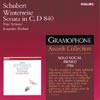Schubert Winterreise
Two pairings of superb artists, and happily one produces a truly great winterreise…
View record and artist detailsRecord and Artist Details
Composer or Director: Franz Schubert
Genre:
Chamber
Label: Decca
Magazine Review Date: 9/2004
Media Format: CD or Download
Media Runtime: 75
Mastering:
Stereo
Catalogue Number: 467 092-2DH

Tracks:
| Composition | Artist Credit |
|---|---|
| Winterreise |
Franz Schubert, Composer
Alfred Brendel, Piano Franz Schubert, Composer Matthias Goerne, Baritone |
Composer or Director: Franz Schubert
Genre:
Vocal
Label: Gramophone Awards Collection
Magazine Review Date: 9/2004
Media Format: CD or Download
Media Runtime: 0
Mastering:
Stereo
DDD
ADD
Catalogue Number: 475 490-2PGR2

Tracks:
| Composition | Artist Credit |
|---|---|
| Sonata for Piano No. 15, 'Relique' |
Franz Schubert, Composer
Franz Schubert, Composer Sviatoslav Richter, Piano |
| Winterreise |
Franz Schubert, Composer
Franz Schubert, Composer Peter Schreier, Tenor Sviatoslav Richter, Piano |
Author: John Warrack
There is immediate sympathy in the steady trudge of the opening song, ‘Gute Nacht’. Tempo is not the same as speed; it is also a matter of weight. Brendel not only strikes a just pace but gives the wanderer’s repeated chords a fullness that supports the warmth and humanity of Goerne’s voice. Extremes of despair tend to be more clearly articulated by the tenor voice in this cycle, by Peter Schreier and still more by Peter Pears with Benjamin Britten. Goerne can lighten his tone expressively, as at the turn to the major in this first song as Brendel also lightens but slightly deadens the tone, though there is never the sense that he has lost his grasp on the human suffering. At the very end of the cycle, when he asks if he may join the old hurdy-gurdy man, there is a touching sense of courtesy in the request where other singers, not excluding Fischer-Dieskau, have produced a final howl of anguish.
Though he has learnt much from Fischer-Dieskau, Goerne’s performance is very different. He never singles out words for emphasis when they are more expressively absorbed into a longer phrase, as Brendel unfailingly understands. This makes the repeated cry of ‘Wein, wein…’ (‘Weep, weep on the grave of my hope’) in ‘Letzte Hoffnung’ or of ‘Weh’ in ‘Wasserflut’ the more deeply touching for the grief being inward. Similarly, Brendel does not stress the graphic, as he and particularly Gerald Moore found it suitable to do for Fischer-Dieskau. The blanketing snow in ‘Wasserflut’, the horn echoes of ‘Der Lindenbaum’, the snarling dogs of ‘Im Dorfe’ are played not as imitations but as symbols of the settling chill at heart and the wanderer’s distancing himself from the beauty and also the hostility of the world.
These closely shared perceptions mark the entire cycle. Brendel’s soft staccato chords introducing ‘Auf dem Flusse’ prepare the way for Goerne’s quiet, ironic singing of the once merry brook now no longer greeting him. Brendel opens ‘Frühlingstraum’ as if it were a long-forsaken dance, and there is a free rubato to match Goerne’s use of a harsher tone when the mood is shattered. Ending ‘Die Krähe’, his ritenuto as well as diminuendo grow out of Goerne’s sorrowful phrasing of ‘Treue bis zum Grabe’ (‘True to the grave’). In ‘Täuschung’ the sharp but light staccato left hand against the gently repeated notes in the right produce a magical effect for the weird colouring which Goerne finds for the deluding light ahead of him. ‘Das Wirtshaus’ is very slow, the pace unrelentingly maintained through the graveyard until Goerne warms his voice as he holds on to his ‘treue Wanderstab’, the trusty staff that is now his only support. Even the broken phrases of ‘Der Leiermann’ maintain a long line through the song, with the bare hurdy-gurdy fifths on the piano suggesting barrenness and the voice finding gentle sympathy for the old man and his empty plate.
To turn from this to Peter Schreier and Sviatoslav Richter is to embark on quite another journey. Here are two more artists of the highest distinction, each with his own perceptions. That, indeed, is what holds the performance back from greatness. Schreier’s performance, well known and justly admired, is filled with subtlety, depicting a sufferer whose despair constantly breaks out. He colours his voice expressively, not shirking harshness in, for instance, ‘Die Wetterfahne’. Richter’s delicacy of touch can be magical, as with the rustling leaves of the ‘Lindenbaum’, and he can point detail which movingly illustrates the wanderer’s decline. Yet his sensitivity does not always engage with the steady, tragic progress. Nor are the tempi always apt. ‘Gute Nacht’ is laggard, as is ‘Gefrorne Tränen’ (which is marked ‘nicht zu langsam’).
The two performances do not exactly coincide. There is not the sense of a fully shared interpretation that becomes more than the sum of two artists, however fine. Writing of Goerne’s previous recording in January 1998, Richard Wigmore concluded that it was ‘a very good Winterreise that may one day become a great one’. I believe it now has.
Discover the world's largest classical music catalogue with Presto Music.

Gramophone Digital Club
- Digital Edition
- Digital Archive
- Reviews Database
- Full website access
From £8.75 / month
Subscribe
Gramophone Full Club
- Print Edition
- Digital Edition
- Digital Archive
- Reviews Database
- Full website access
From £11.00 / month
Subscribe
If you are a library, university or other organisation that would be interested in an institutional subscription to Gramophone please click here for further information.




